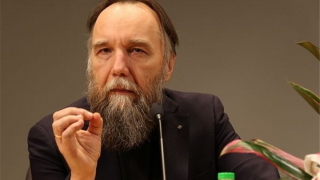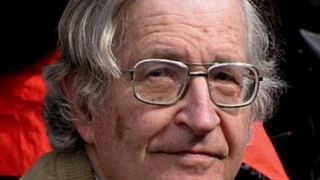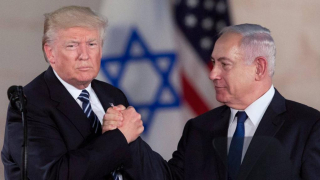Who’s in Charge? The Israel Lobby Ten Years Later
The Summer of 2017 marked the tenth anniversary of the publication of Stephen Walt and John Mearsheimer’s book The Israel Lobby and U.S. Foreign Policy.
Mearsheimer, who was Professor of Political Science at the University of Chicago and Walt, who was Professor of International Relations at the Kennedy School of Government at Harvard University, occupied the inner sanctum of American academe and perhaps because of the power and job security that went with those positions felt they could challenge a force in American politics that was so powerful no one dare mention its existence much less criticize its policies as having a “negative effect on America’s interests.”[i] The reaction to the book was every bit as fierce as the authors anticipated. As anyone could have predicted, fellow Harvard professor Allan Dershowitz, called Walt an anti-Semite for broaching the issue.
In the end neither man lost his job, but neither man emerged unscathed either. In spite of becoming a New York Times best-seller by breaking new ground, the publication of The Israel Lobby “ruined both men’s chances to serve in government or in university administration.”[ii] Because, as Walt put it, “both universities were very nervous about the fallout,” neither man was able to advance his career in either government or academe. Whatever regret both men felt paled next to the sense of duty that drove them to write the book. “If we weren’t willing to do that, then hardly anybody else would be. We couldn’t lose our jobs. We didn’t necessarily need government employment to pay the mortgage.”
The idea of doing a book on the Israel lobby originated in the brief gap between 9/11 and the war in Iraq, which the neoconservatives used as its justification. The book had been brewing in the minds of its authors since the 1990s but the immediate impetus was the attack on the World Trade Center towers on September 11, 2001. That attack was used as an excuse to invade Iraq, and the invasion of Iraq, which had no “weapons of mass destruction” and had nothing to do with 9/11, made it clear that American interests no longer controlled American foreign policy, certainly not in the Middle East.
In 2002, The Atlantic Monthly commissioned an article on the topic after Mearsheimer brought it up at a meeting of the American Political Science Association convention in Boston. When Walt and Mearsheimer finally submitted their article in 2005, the Atlantic got “cold feet and killed the piece,”[iii] leaving the ms in limbo until the London Review of Books expressed an interest and eventually published it in March 2006, thereby provoking “an immediate firestorm,” according to Walt. At this point the article landed on the internet, which turned it into an international phenomenon. According to Mearsheimer:
The internet was indispensable for making this article available to people all over the world. If this had been published in the London Review of Books in 1985 or 1990 when there was no internet, hardly anybody would have taken notice. But in the age of the internet, this article just ricocheted all over the world very, very quickly. . . Rashid Khalidi at Columbia University told me that the morning after the piece had hit the internet, 14 different people had sent him a link for the piece. It was such a big bombshell.
The Israel Lobby suffered a major defeat when the Obama administration passed the Iran nuclear deal, but after the election of Donald Trump, the Lobby is now stronger than ever. And yet Israel’s position is now more precarious than it was before the United States invaded Iraq in 2003. How is this possible?
Like the book exposing the Israel Lobby, the election of Donald Trump goes back to 9/11 when certain elements in the military and intelligence community realized. According to Dr. Steve Pieczenik, the war in Iraq ignited a civil war within the Deep State:
The Iraq war was fabricated for no other reason than to make Israel the center of mid-East foreign policy and take down Saddam Hussein . . . they had alienated many of us who knew that the neo-con position was totally false. . . that Israel was basically the Middle East and we would be the primary power all over the Middle East, . . . and so we had to neutralize the neocons. That’s where I came in, and I understood each one of them Wolfowitz, Perle . . . The military began to understand that when they were in Iraq, they were being used. There was really no purpose to go in there and take out Saddam Hussein, and what happened is Iran became the real victor.[iv]
Pieczenik’s claim that 9/11 was a false flag operation, followed by the claim that the Rumsfeld/Cheney faction was behind it was sensational enough, but it diverted attention from the incoherence of Pieczenik’s story. The whole point of the interview is that a certain faction in the CIA approached Trump because they were appalled by the neconservative takeover of American foreign policy. If that is the case, how then does Dr. Steve explain the fact that Trump is more pro-Israel than either of the Bushes? Pieczenik’s anti-neocon revolution led to an even more pro-Israel foreign policy than the Neoconservative regime which precipitated the revolution in the first place. This doesn't make sense. Or am I missing something?
Trump, we are told, is part of a bigger plan. This is certainly a good story, but what’s the plan? Is there any evidence of a plan emerging after his first year in office? Is there any evidence of a plan emerging after 9/11? Well, yes, there is, but in trying to understand it we need to distinguish between the intention of the planners and the eventual outcome of the plan.
To begin with the former, the neocons, operating under the guise of a Project for a New American Century, proposed its “clean break” plan for using the US military to remove Israel’s enemies from the Middle East. Saddam Hussein was at that time Israel’s main enemy, and so it came as no surprise that Iraq was the first nation targeted for invasion.
That was the intention. The outcome was quite different. Instead of being greeted with open arms, as Paul Wolfowitz predicted, America’s troops, after an initial easy victory, became bogged down in a protracted guerilla war which cost more American lives than the initial invasion and led to the Iran’s hegemony over its most bitter recent enemy. Saddam Hussein launched his eight-year-long war against Iran at America’s behest. An internet search will reveal pictures of Saddam Hussein shaking hands with Donald Rumsfeld sealing the deal. The intention here was clear. The United States was using Saddam Hussein to punish Iran for the US hostage crisis. Saddam Hussein was eager to become the U.S. puppet, even to the point of using the poison gas America’s military provided against Iranian citizens.
In an act of perfidy which beggars the imagination, the Americans then used the fact that Saddam Hussein followed their orders in launching poison gas attacks against Iran at their behest as evidence that he possessed weapons of mass destruction, which became the pretext for invading Iraq.
Once the Neocons took over American foreign policy in the wake of 9/11, America turned on its erstwhile ally and brought about not only his defeat but the victory of his former enemy, namely, Iran and the creation of the Shi’a crescent stretching from Tehran to the Gaza strip.
The neocons, in other words, brought about the complete opposite of what they intended. In order to rectify their mistake, the neocons had to start another war, this time in Syria, to break up the Shi’a crescent that they themselves had created in the first place by toppling Saddam Hussein.
As Dr. Steve indicates in his interview, America just lost that war. Trump, we know from earlier reports, made an agreement with Vladimir Putin to end hostilities in Syria. Russia and Iran were Syria’s main allies in the recent war which America, Israel, Qatar, and the Saudis just lost. If Trump has a plan, that plan was to disengage. However, that’s not what happened. Recently, Secretary of State Rex Tillerson announced that American troops would remain in Syria indefinitely. In order to accomplish their mission, these troops have to rely on the Kurds as their allies in northeaster Syria, but in relying on the Kurds, Tillerson enraged Prime Minister Erdogan of Turkey, who immediately ordered an invasion.
Trump then fired Tillerson and shortly thereafter announced that he planned to withdraw American troops from Syria. This announcement provoked another false flag poison gas attack, in Ghouta, which then led Trump to blow up three buildings, with the collaboration of the Russians. It also led Nikki Haley, the Deep State’s representative at the United Nations, to announce that the United States would not be withdrawing its troops after all.
If there’s a plan here, it’s difficult to discern.
Liddell-Hart once said that the point of strategy was to put one’s opponent on the horns of a dilemma. The Trump administration has succeeded instead in putting itself on the horns of a dilemma of his own making. After Turkey invaded Syria following his announcement, Tillerson had two options: he could attack Turkey, which happened to be a fellow member of NATO and thereby bring about the collapse of one the pillars of the American empire, or he could ally himself with his archenemy Assad, the man the United States has spent the past five years trying to depose.
Once again American policy had brought about the exact opposite of what it intended. After two wars, one which the US won and one which the US lost, the Shi’a crescent was stronger than ever.
Enter Trump once again. Does Trump have a plan in the Middle East? And if so what is it? Trump’s main challenge during the first year of his administration was simply remaining in office in the light of the Deep State’s attempt to destroy him and his presidency. Recognizing this fact, Trump turned to the only political force in America powerful enough to save him. That force is the Israel Lobby, which in spite of a major defeat at the hands of the Obama administration, was stronger than ever. Their control over the Congress was complete. Seeking their protection against the Deep State, Trump recognized Jerusalem as the capital of Israel by signaling his intention to move the US embassy there. In doing this, he showed himself as more of a neoconservative than the Bush/Cheney/Rumsfeld administration and their allies in the CIA. In order to ensure that the Jews got his message, Trump at around the same time threatened to de-certify the Iran nuclear deal. In both instances, the intention was clear. Trump needed Jewish support to remain in office and in order to get that support he was willing to do what no other president had dared to do before him. That was the intention, but what was the outcome?
As in the case of Tillerson’s announcement about his plans to keep American troops on Syrian soil indefinitely, Trump’s announcement threatened the existence of the network of treaties which lie at the heart of the America Empire, most particularly NATO. Shortly, after announcing his intention to revoke the nuclear agreement, Sigmar Gabriel, foreign minister of Germany, one of the signatories to the Joint Comprehensive Plan of Action or JCPOA, announced that if he followed through on this plan Trump would bring about “the end of the world.” What he meant to say was the end of NATO, which was already on its last legs because of Turkey’s de facto secession. In December 2017 Gabriel gave a speech in which he imagined a post-American Europe. In that speech,
he explicitly questioned whether the U.S. might become a competitor. He outlined that Germany and the EU need to define their own interests and draw red lines on, for example, U.S. sanctions on Russia that threaten German energy interests. The speech may be just more rhetoric. But Chancellor Merkel expressed similar sentiments during the recent election. With Merkel and Gabriel’s parties looking like they will form the next German government, it is also possible that the most powerful country in Europe is finally starting to consider how to manage a post-American Europe.[v]
Similarly, by moving the US embassy to Jerusalem Trump provoked a UN resolution, in which virtually the entire world condemned his action, isolating the US diplomatically in a way that had not happened since the founding of that organization. The seven nations which supported the US and Israel were made up of microscopic islands in the Pacific Ocean like Nauru, Palau, and Micronesia and client states ruled by Christian Zionists like Guatemala, which has been a US satrapy since the 1954 CIA coup d’etat.
So is Trump making America great again? Or is he single-handedly dismantling the American Empire?
Both Walt and Mearsheimer would go on to learn that success in publishing an idea does not necessarily lead to an idea’s implementation as government policy. “I don’t think we—or anyone else—has had much influence on policy,” Mearsheimer opined with the benefit of ten years of hindsight:
I think the lobby is still as powerful as ever. It’s now more out in the open, and that’s not necessarily a good thing for a lobby, but it’s still remarkably effective. This is why you saw all those Republicans falling all over themselves in the 2016 Republican primaries to say how devoted they were to Israel, because they understand that you don’t want to cross the lobby.
Why is the Israel Lobby more powerful than ever? The main reason is what Charles Bausman of Russia Insider recently called “the Jew Taboo.”
On January 15, 2018, Charles Bausman published an article on Russian Insider entitled “It’s Time to Drop the Jew Taboo,” claiming that the Jew Taboo was “making serious discussion of Russian geopolitics and history next to impossible.”[vi] The Jew Taboo has become so strict that “One cannot even criticize a small subsection of Jews, a miniscule percentage of the Jewish population, even when they richly deserve it.”
This problem has now taken on geopolitical ramifications. Bausman published the article because he is:
convinced that unless we break this taboo, nothing will improve in the human catastrophe unfolding in geopolitics. Millions have died over the past 30 years, and if we want it to stop that trend and avoid a cataclysm which seems to be approaching inexorably, we have to have the freedom to criticize those responsible. It is very clear to me, as it is to many others, that much of the guilt for this comes from Jewish pressure groups, particularly in the media.[vii]
Those who understand the status quo but lack the courage to challenge it have recourse to euphemisms.
The main manifestation of the Jew Taboo in our day is the use of euphemisms like “secularizing activists,” or “Anglozionists,” or “globalists.” As Israel Shamir pointed out, Anne Coulter brought humor to the discussion of the Jew Taboo when she tweeted that “Paul Newman is only half globalist” and “Israel is the last refuge of globalists.”[viii]
We need to put an end to the euphemisms that ensure the defeat of our cause, because
The use of euphemisms makes an accurate understanding of the current global situation impossible. It is impossible to understand the current wave of Russophobia sweeping the West or the demonization of Vladimir Putin without discussing Jews and their ancestral, centuries-long animosity toward Russia because “Jew” is “the only term that accurately describes it.”
Neoconservatism, “Russia’s harshest foe,” is Jewish. American foreign policy after the fall of Communism is incomprehensible if that fact is suppressed because:
their trouble-making extends far beyond Russia - they are responsible for America's disastrous debacle in the Middle East over the last 20 years - where their crimes have been stymied by precisely one country - Russia. The psychotically anti-Russian recent UN ambassadors, Nikki Haley and Samantha Power, were put there by the Israel lobby, and given an independent brief, in other words, they answer not to their presidents, rather to their Jewish sponsors.[ix]
The main self-defeating euphemism is “Zionist.” Zionist and Jew are not synonyms. To mistake one for the other is a category mistake which has significant geopolitical consequences. The Zionists would have no power, nor would they have their own state today, were it not for the control which Jews exert over both finance and the media, both in the United States and in Europe. The rise of their power began when Nathan Rothschild bet the prince of Hesse-Cassel’s fortune on a rise in the consol, the British state backed bond, based on insider knowledge of Wellington’s victory over Napoleon. As Walt and Measheimer have pointed out, that control has continued to continued to our day, when the money of Jewish usurers like Dan Gilbert and Jewish Casino moguls like Sheldon Adelson is used to control the political process in America.
What is true of Russia is a fortiori true of America’s culture wars. The Catholics lost all of those battles because they couldn’t fight back, and they couldn’t fight back because they couldn’t identify who was attacking them and everything they held sacred.
Catholics have been losing the culture wars for the past 53 years because Catholics can't identify the enemy, and they can’t identify the enemy because they can’t say the word “Jew.” What happened 53 years ago? The Second Vatican Council ended in the same year, 1965, in which Hollywood Jews broke the production code which had kept them in line for the previous 31 years. The Catholics succeeded in preserving common decency and the moral order because Joe Breen, who became the head of the Production Code in 1933, knew how to say the word Jew. “These people are eastern European Jews,” he wrote to the American bishops, “They are the scum of the earth. The entire film production of the US should not be left in their hands.”
One defeat after another followed the Catholic capitulation to the Jews in Hollywood. The Supreme Court handed down Griswold vs. Connecticut, the decision decriminalizing the sale of contraceptives, in the same year the Jews broke the Production Code in Hollywood. Contraception was a WASP crusade, but it led to Roe v. Wade, the decision which decriminalized abortion. Abortion, as Bernard Nathanson pointed out, was the Jewish crusade par excellence. The Jews’ success in de-criminalizing abortion led inexorably to Obergefell, which was the Supreme Court decision legalizing gay marriage.
In an article which appeared in Tikkun magazine, Amy Dean clearly identified who was responsible for gay marriage. It wasn’t Zionists. It was “Jews and their social justice organizations.”[x] Vice-President Joe Biden said the same thing. However, if I were to claim that the Jews were behind gay marriage, I would be labeled an anti-Semite.
On April 30, 2018, Mahmoud Abbas, president the Palestinian Authority, broke the Jew taboo when he gave a speech about, not Zionism, but Jews’ expulsion from European countries because of their involvement in usury.[xi] According to a report in The Jerusalem Post, Abbas claimed that:
From the 11th century until the Holocaust that took place in Germany, the Jews – who moved to Western and Eastern Europe – were subjected to a massacre every 10 to 15 years. But why did this happen? . . . The Jewish issue that was widespread in all European countries... was not because of their religion, but rather their social role related to usury and banks.[xii]
Abbas was quickly labeled an anti-Semite, not because he believed in the racial ideology that Wilhelm Marr proposed when he created the term “anti-Semite” in 1871, but because the violated the Jew Taboo, which in its simplest form comes down to this: no one is allowed to criticize Jews. An anti-Semite used to be someone who didn’t like Jews, now it is someone whom Jews don’t like. Abbas could not have used the Zionist euphemism because Zionism did not exist in 13th century Europe. In fact, the term did not come into existence until centuries later. Abbas was quite right in rejecting euphemisms like “Zionist,” because they prevent any discussion of history which might contextualize the problem Palestinians now face.
What is true of Russians and American Catholics is a fortiori true of the supporters of justice in Palestine. They have been crippled by internalizing the Jew taboo. They have not only internalized the commands of their oppressors, what is worse, they impose this taboo on anyone who violates Jewish speech codes. Two examples spring immediately to mind: Gareth Porter called Mark Glenn an “anti-Semite” and had him removed from one of these conferences a few years back.
Roughly two years ago I taped an interview with Miko Peled on the Palestinian issue after he had spoken on that topic at Notre Dame. That interview never got aired because of the Jew Taboo. Peled accused me of anti-Semitism because I claimed that in 1967 American Jews switched their allegiance from socialism, in particular to the American Civil Rights movement, to Zionism. According to the Jew Taboo, I should have said American Zionists switched their allegiance from socialism to Zionism, but that sentence would have made no sense.
In his book The Art of War, Sun Tzu said that:
If you know the enemy and know yourself, you need not fear the result of a hundred battles. If you know yourself but not the enemy, for every victory gained you will also suffer a defeat. If you know neither the enemy nor yourself, you will succumb in every battle.
Catholics have lost every single battle in the culture wars because they cannot bring themselves to say the word Jew. Because they cannot say the word Jew, they cannot identify the enemy.
The Jews have no such qualms in identifying their enemies.
In her Tikkun article celebrating gay marriage, Amy Dean clearly defined the enemy as the Manhattan Declaration, Robbie George, and the Catholic Church in ascending order of importance. Catholics like Archbishop Charles Chaput of Philadelphia lost the gay marriage battle because they identified the enemy as “secularizing activists” and not as Jews. Catholics are not allowed to talk about Jews. They are most certainly not allowed to criticize Jews. Clerics like Chaput base this taboo on Nostra Aetate and think that they are implementing Vatican II when they capitulate to the cultural taboo which has been known since the time of Christ as “fear of the Jews.” Fear of the Jews is especially virulent in our day. It is a function of Jewish political power.
The Jews defeated the Catholics in the gay marriage battle, according to Dean, because they had “a clear moral position rooted in religious values.” It was “Jewish leaders” who “helped reassure voters who may have been unsure about the religious implications of voting for marriage equality.” Her position is what Nietzsche would term “die Umwertung aller Werte” or the transvaluation of all values. The Jewish rebellion against logos insures that what used to be bad, i.e., sodomy, is now good. What used to be good, opposition to sodomy, is now bad. The Jews refer to this form of moral subversion as Tikkun Olam, or healing the world. The result is inevitably some heaven on earth like the one Bolsheviks created in the Soviet Union, which leads to untold suffering before it collapses in a cloud of disillusionment and the Jews move on to their next messianic movement.
Tikkun Olam is the Jews’ term for what I call The Jewish Revolutionary Spirit. The Jew Taboo prevents any understanding of the Jews’ role in human history.
The year 2018 marks the tenth anniversary of the publication of my book The Jewish Revolutionary Spirit bespoke my attempt to break the Jew Taboo and re-situate discussion of the Jewish question where it belongs, which is to say, as a theological rather than a racial issue. The Jewish Revolutionary Spirit began at the foot of the cross. When the Jews rejected Christ, they rejected the Logos Incarnate, and when they rejected Logos, they became revolutionaries, which is what they have remained to this day.
The axis of human history is the war between Logos and anti-Logos. This war involves the conflict between those in justice and those who do not. Socrates criticized Thrasymachus for saying that justice was the opinion of the powerful, but the Jew Harari said exactly that in his book Sapiens.
Hegels' word for Logos is Vernunft. He describes the movement of Logos through history as "die List der Vernunft," which usually gets translated into English as the "cunning of reason." God uses wicked men to bring about His intentions not theirs.
In coining the term Hegel is suggesting that there is an underlying plan to human history which individual men may or may not understand and which finds its completion more often than not in spite of their intentions rather than because of them. The World Spirit, one of Hegel’s many synonyms for God, realizes its own purposes through human action, which is often driven by passions which are the opposite of Logos. This “idea pays the tribute of existence and ephemerality not out of its own account but out of the passions of the individual.” (Die „Idee bezahlt den Tribut des Daseins und der Vergänglichkeit nicht aus sich, sondern durch die Leidenschaften der Individuen.“)[xiii]
The key term here is “Leidenschaft” or passion, which means a blind drive which is the antithesis of reason. St. Augustine puts it this way: “Even those who set themselves up against you, do but copy you in perverse way.” The State, according to Hegel, is the vehicle of Logos in world history. The State is the “historical fate” of not only its citizens but of historical figures like Napoleon whom Hegel characterized as the “Weltgeist zu Pferde,” or the world spirit on horseback, after watching him ride triumphant into Jena, where Hegel was teaching at the time, after defeating the Prussian army. “Man’s vocation is inscribed in the state, and he becomes its tool.”
This may strike a nation of rugged individualists as a denial of human freedom, but it is not. It is a claim that human freedom does not have the final say in the outcome of human history:
The objective spirit realizes itself in world history, which is one of its forms, alongside of Law and Custom. States may wage war against each other in the course of history, they may disappear or be reborn, but either way these manifestations of world history are nothing more than organs of the World Spirit, who purposes they carry out, even if they intend to act in another interest. It is in this way that the deception of Logos allows passion to act on her behalf.[xiv]
That final say in human history is reserved to the Logos who created space and time and, therefore, the modalities of human history in the first place. The claim that Logos is cunningly using Trump to bring about the demise of the American Empire is still the only coherent account of his administration and its relation to the Israel Lobby to date.
But what is our role in all of this? Our role is to identify the enemies of Logos, and we can only do this by breaking the Jew taboo.
If we don’t we cannot understand the movement of Logos in history, which means that we can’t understand how that battle between Logos and anti-Logos is playing out in our day.
So what is the plan? Our plan is promoting Logos. Donald Trump is acting according to a plan which is not of Trump’s making. As I said in more than one interview on PressTV, God is making use of Donald Trump to bring about the end of the America Empire. That is God’s plan, and it holds true for every empire on earth—past, present, and future. The United States fell under this plan when it abandoned the American Republic and embarked upon the road to empire. The trajectory of every empire was described in the Book of Daniel, and then refined by St. Augustine in the City of God, who likened all empires to criminal enterprises.
All of human history is a conflict between the forces of Logos and the forces of anti-Logos. St. Augustine identified these two forces as the City of God and the City of Man. The main agents of anti-Logos in human history have been the Jewish people. Their hatred of Logos makes them “enemies of the entire human race,” a claim which is empirically verifiable by their behavior in Gaza on the eve of the 70th anniversary of the founding of the Zionist entity. Nothing is going to change until the Jews abandon their war on Logos. But, as things stand now, the Jews have no reason to change their behavior because no one is holding them responsible for their actions.
[xiv] Der objektive Geist verwirklicht sich in der Weltgeschichte, die, neben dem Recht und der Sittlichkeit eine seiner Gestalten ist. Mögen im Verlauf der Geschichte die Staaten auch Kriege gegeneinander führen, untergehen oder wieder auferstehen, so sind seine welthistorischen Repräsentanten doch nichts weiter als Organe des Weltgeistes, dessen Zwecke sie umsetzen, selbst wenn sie in einem anderen Interesse zu handeln meinen. Auf diese Weise lässt die List der Vernunft die Leidenschaften für sich wirken.[7]














